Are you wondering how to use AI for marketing? You’re not the only one!
AI is changing the game in many fields, making businesses run smoother and more efficiently.
Using AI can boost your business’s productivity. As someone in the industry for years, I can tell you that the top companies are all looking into AI to stay ahead.
You’ll be surprised to know that more than 80% of industry professionals use AI technology in marketing strategies and campaigns.
Imagine sending out personalized ads that your customers want to click on or analyzing significant amounts of data in seconds to know exactly what your customers are looking for.
You don’t have to be a tech expert to get started. By the end of it, you’ll know how to use AI to make your marketing efforts much more effective.
Let’s dive in and make your marketing smarter with AI!
Why Use AI for Marketing?

Utilizing AI in marketing is about leveraging artificial intelligence technologies to get deeper customer insights and create more relevant content.
Marketing strategies empowered by artificial intelligence are custom-made to suit the customer journey, beginning with chatbots, precisely targeted ads and auto-generated content.
In the typical AI marketing strategy, artificial intelligent tools gather high-quality data, study consumer behavior, and employ data analysis to assist a business in reaching its objectives.
AI can even engage with your target audience based on specific actions on your site, such as pressing a button or interacting with your social media posts.
The significance of AI in the marketing landscape is already evident.
In 2021, the market value for AI in marketing was a massive 15.84 billion U.S. dollars, and it’s expected to skyrocket to over 107.5 billion by 2028.
Step-by-Step Instructions on How to Use AI for Marketing
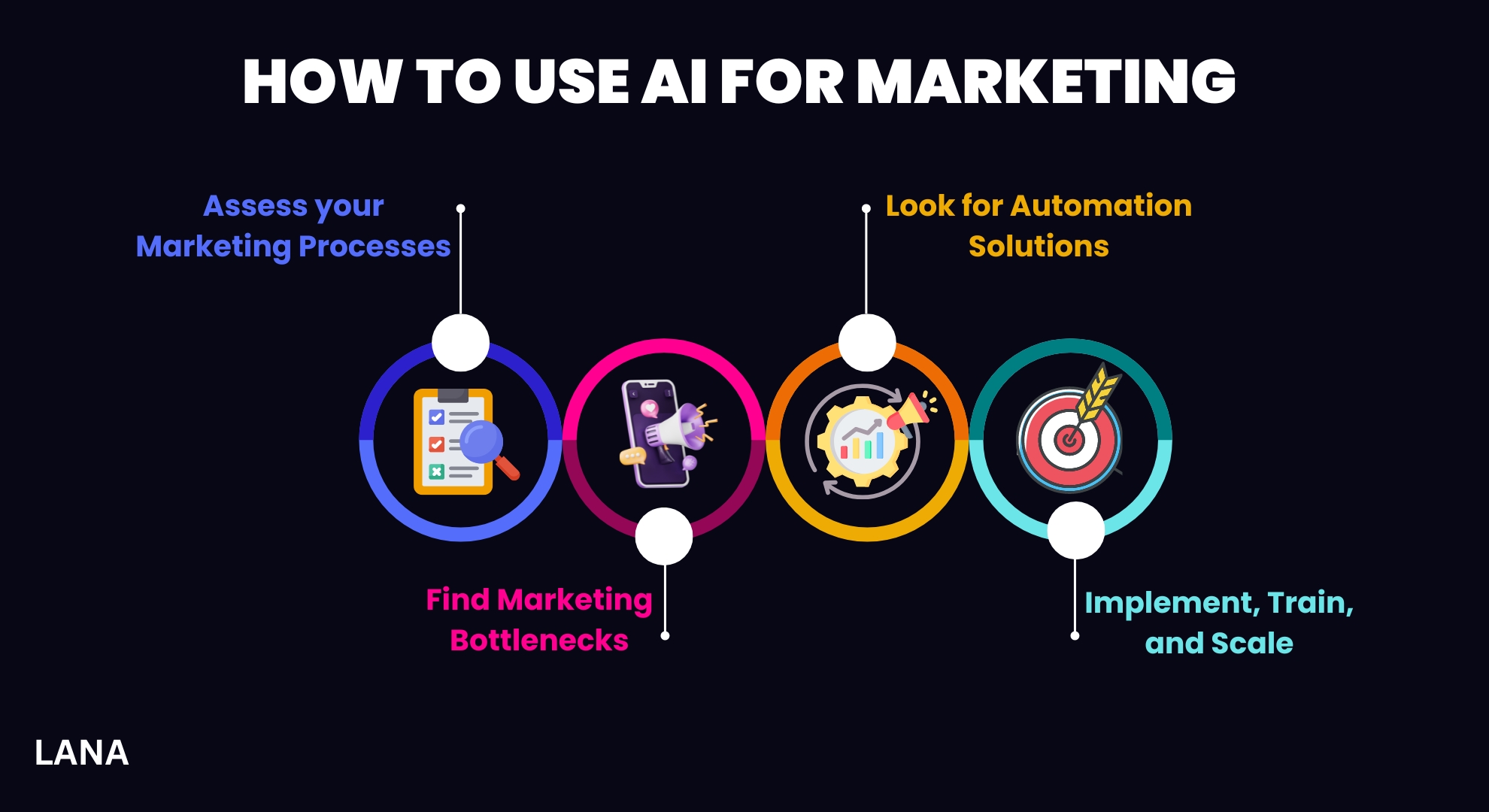
Incorporating AI into your marketing efforts isn’t a one-off task; it’s a multi-step journey. From evaluating your existing marketing campaigns to adopting, instructing, and growing your AI marketing tools, each phase is crucial.
Below are the various stages needed for integrating AI into your marketing strategies:
Step 1: Assess your Marketing Processes
The initial step in using AI for marketing strategies is examining your current marketing campaigns.
You must comprehend the customer journey and identify where AI can enhance your marketing efforts.
Step 2: Find Marketing Bottlenecks
With your marketing processes assessed, the following stage is to spot marketing bottlenecks.
These are areas where manual activities are hampering your marketing efforts. Consider challenges like generating leads, crafting content, or engaging with customers.
Step 3: Look for Automation Solutions
Once you’ve found your marketing bottlenecks, it’s time to seek out automation solutions to make your life easier.
This means exploring different AI marketing tools designed to handle repetitive tasks and boost your marketing efficiency.
Step 4: Implement, Train, and Scale
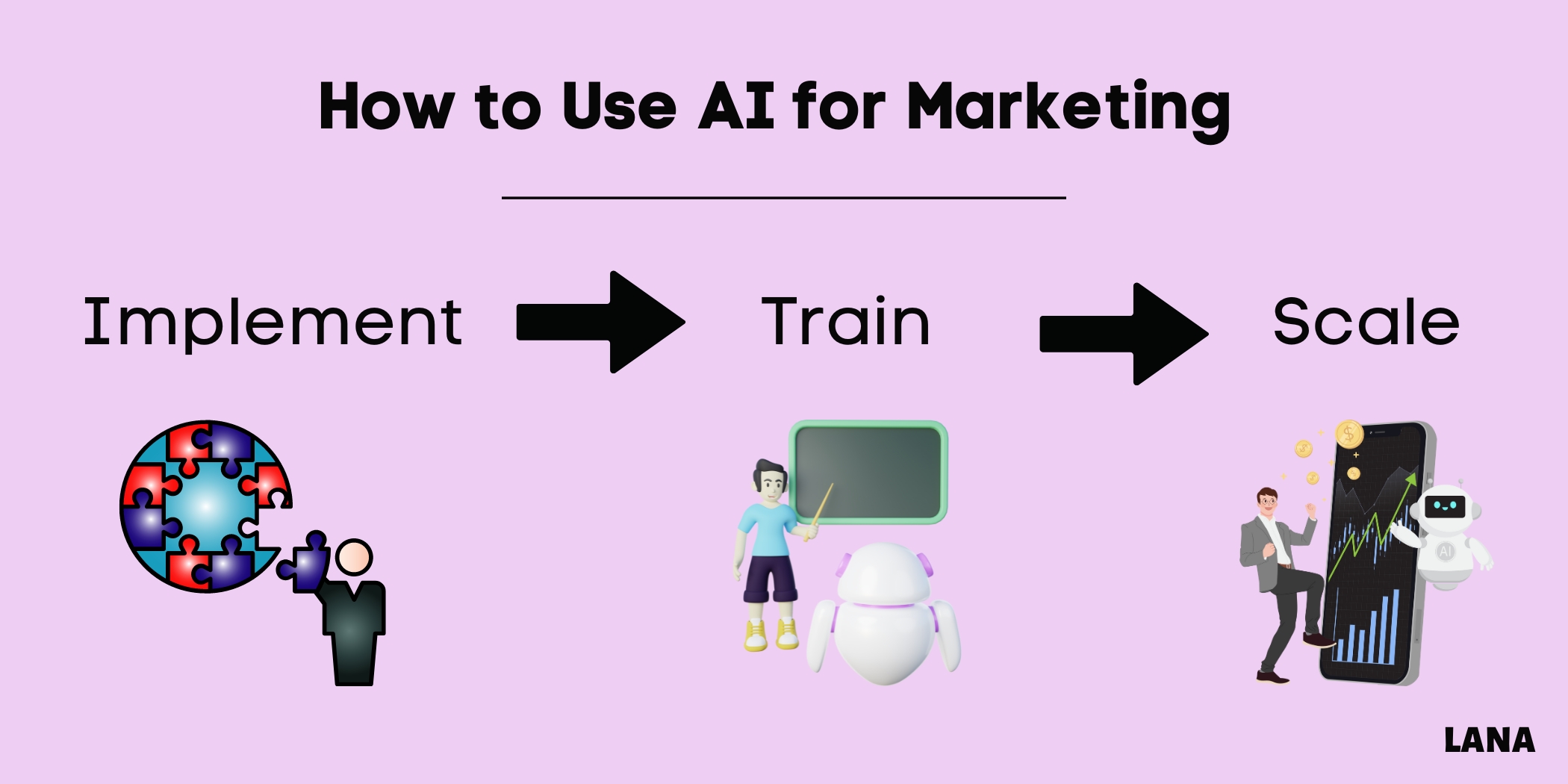
After you’ve picked the right AI solutions, the succeeding stage is execution, training, and scaling.
You should add these AI tools to your existing marketing strategies and coach your marketing teams on maximizing their utility.
You’ll need ongoing monitoring to ensure these tools are hitting the targets you’ve set.
Applying AI in your marketing strategies is a step-by-step game.
You start by examining your current marketing activities, identify challenges, search for automated fixes, and then get down to the nitty-gritty of implementation and optimization.
Adhering to this process can elevate your marketing efforts and spur growth by applying AI.
How can you Use AI for Marketing?
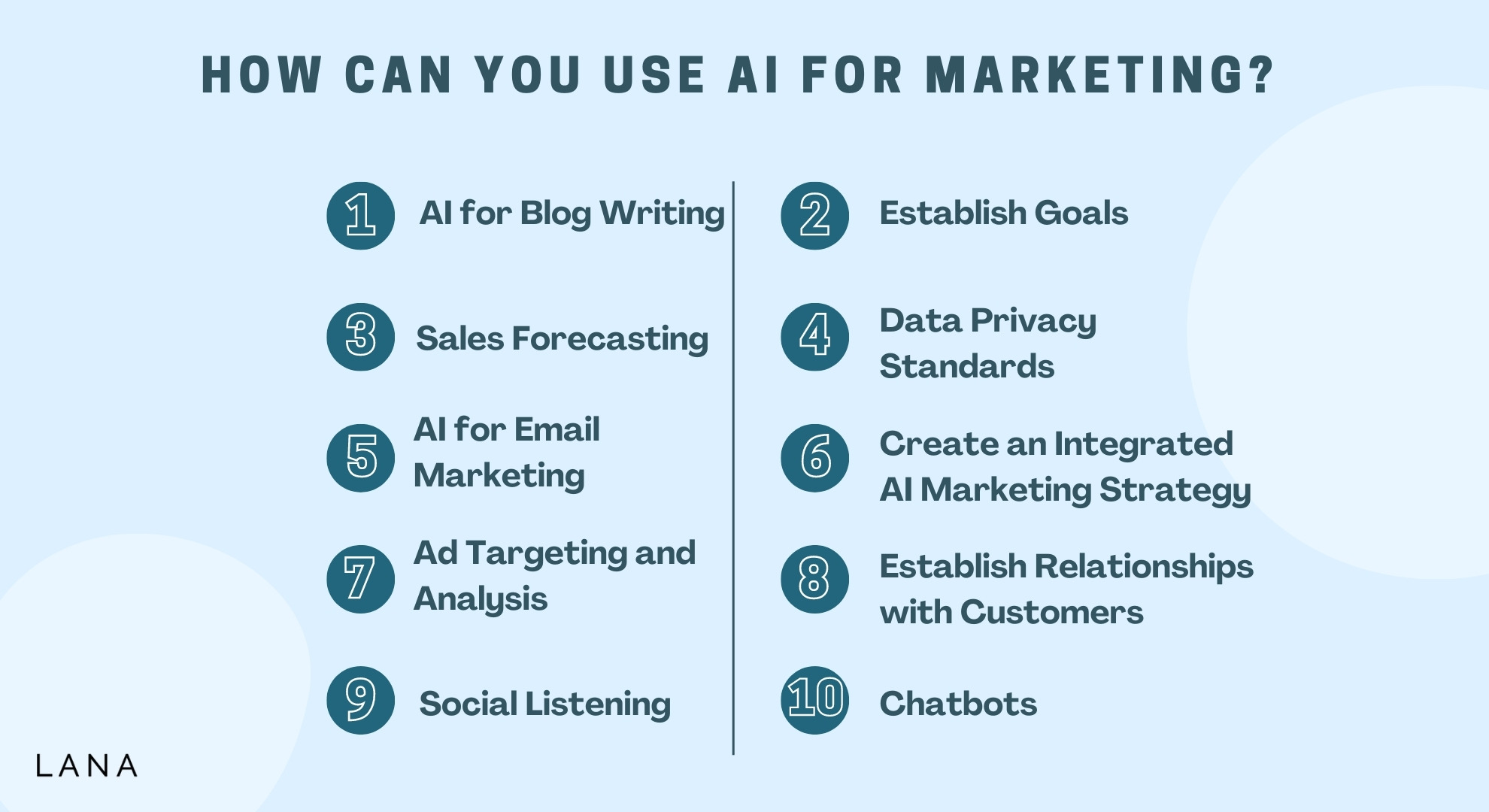
Starting with a well-thought-out strategy is crucial when you’re looking to leverage AI for your marketing efforts.
This planning helps your marketing teams avoid expensive hurdles and get the most for their money in the least amount of time.
Here are several ways and policies for which you can use AI for marketing your brand or business:
1. AI for Blog Writing
Have you ever dreamed of having a tool to generate articles faster for your blog?
AI story generators and AI script generators are almost like your writing twins. Contrary to popular belief, the aim of AI isn’t to take over writers’ jobs but to assist them.
With the aid of AI, writers can:
- Overcome the dreaded writer’s block
- Develop content plans and frameworks
- Rapidly generate long articles for marketing
Generate multiple blog post headlines and summaries efficiently
Tools like Jasper AI and Writesonic or a writing assistant alternative are valuable, but it’s important to note that the initial draft may still need to be prepared for immediate publishing.
Content crafted with AI still requires a human touch for fact-checking and refining. Most of these tools even include a feature to check for plagiarism, ensuring your work maintains its quality.
2. Establish Goals
Like any other marketing initiative, setting distinct goals and utilizing marketing analytics is crucial when integrating AI into your marketing strategy.
Begin by pinpointing parts of your marketing campaigns or processes that need enhancements, such as customer segmentation.
Then, lay out specific KPIs to gauge the efficacy of your AI-enhanced marketing efforts—this is particularly vital for qualitative objectives like “enhancing the customer experience.”
3. Sales Forecasting
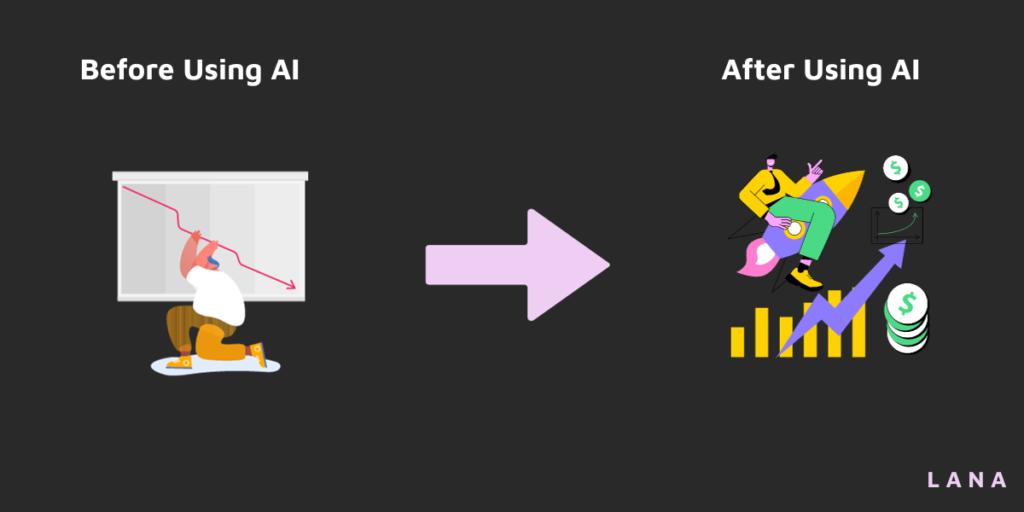
Deciding the right course of action to satisfy customer needs and boost sales is the ultimate aim of every business.
Utilizing AI for marketing and sales enables marketing teams and salespeople to comprehend customer behavior better, informed by collected customer data and their prior purchases.
It enables predictive analytics to forecast customer purchases and inventory levels, helping you determine which products to spotlight and to whom, thus elevating your sales numbers.
It also aids in inventory management, averting overselling or running out of stock.
4. Data Privacy Standards
When starting your new AI marketing strategy, ensure your AI platform respects the boundaries of acceptable data practices in the name of personalized content.
Establish and set data privacy standards in your AI marketing tools to preserve compliance and retain customer trust.
5. AI for Email Marketing
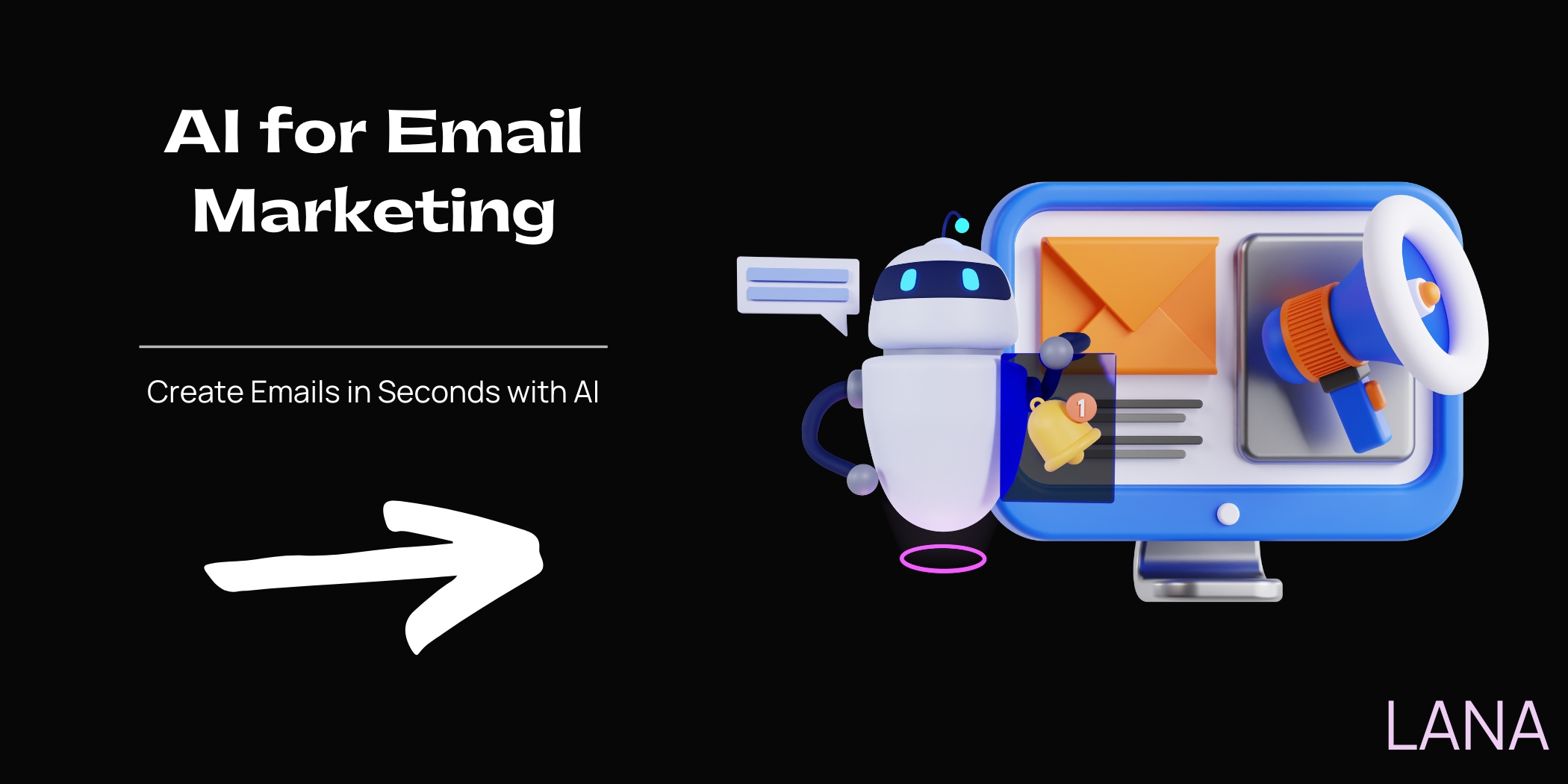
Email marketing can be challenging, especially when operating large mailing lists and complicated campaigns. This is where AI for email writing comes into play.
Suppose you’re a sales rep aiming to draft the ideal email for a set of potential clients or a lifecycle marketing manager pushing out promotional material. In that case, AI can speed up your email creation process significantly.
You can swiftly produce email subject lines that consistently receive high open rates and easily craft personalized sales emails.
AI even offers the option to include automatically generated images to complement your email’s content.
For customer service teams, AI email generator tools can be a game-changer. It allows for rapid and personalized responses to customer messages, comments, reviews, and support queries while maintaining a friendly and approachable tone.
6. For an Integrated AI Marketing Strategy
AI marketing tools are most effective when connected to your existing digital marketing strategy instead of acting as isolated elements.
These AI tools provide the chance to enhance labor-intensive or error-prone areas like making objectives of data analysis and attribution in your marketing efforts.
By plugging AI into these gaps, digital marketers can adopt cutting-edge techniques to elevate their marketing and improve their successful digital marketing practices.
7. Ad Targeting and Analysis
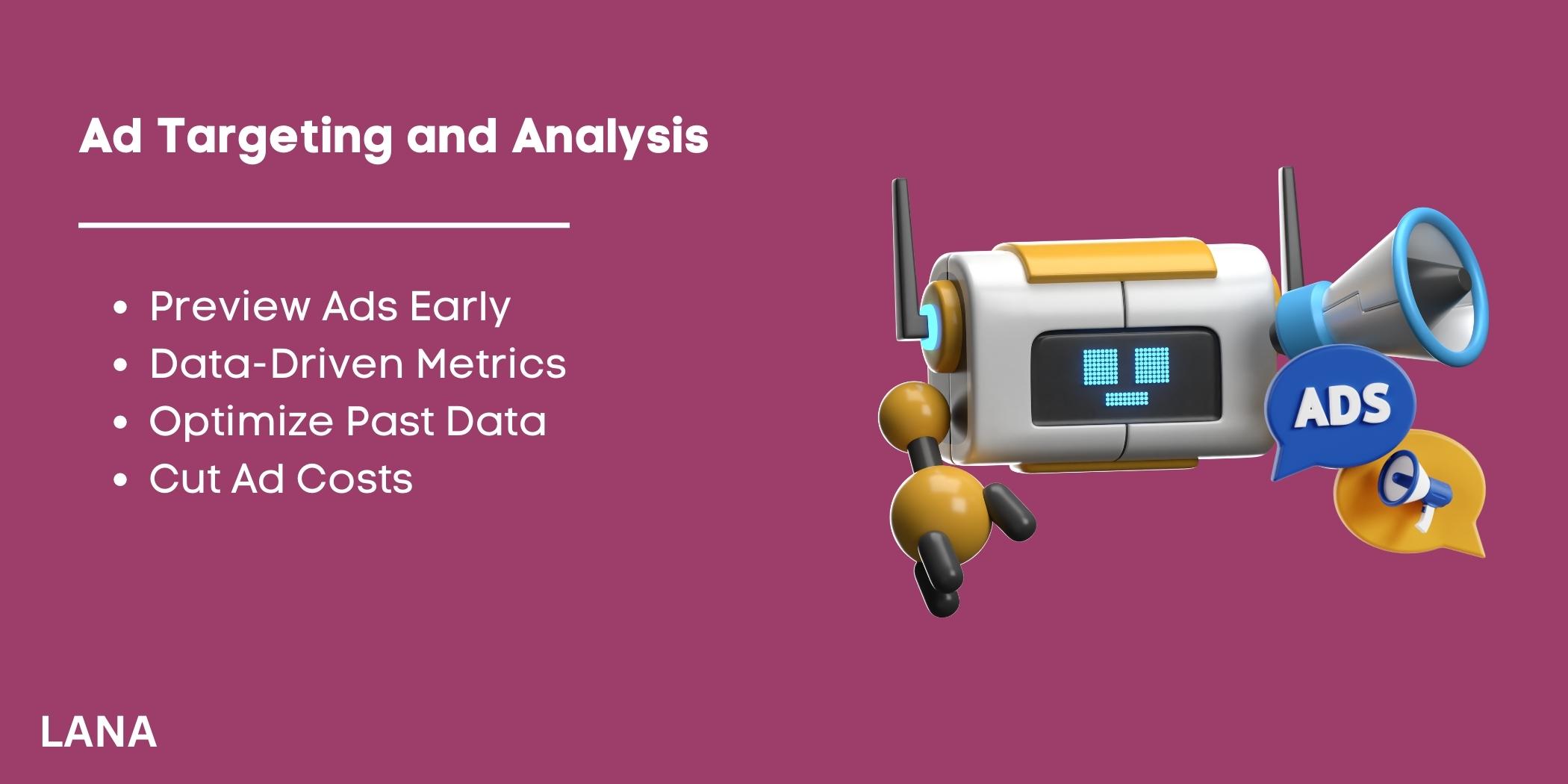
Determining your ad targets is crucial. Who are your customers? Where, when, and how should they encounter your ads?
AI assists in crafting tailored ads that captivate the right audience at the appropriate moment. They enable pre-launch ad analysis.
Tools like Levity predict an ad’s efficacy before you even run a test. Given that ads aren’t cheap, blind testing could be unfavorable to your budget.
Poorly targeted ads risk alienating customers and eroding their trust in your brand.
How Can AI Help You?
- Preview your ad material before it goes live.
- Optimize your AI model using past ad data for enhanced outcomes.
- Access metrics rooted in data to elevate conversion rates.
- Reduce expenses by selecting effective, high-converting ads.
Take Facebook, for instance. The platform places a premium on precision-targeted ads, aiding it in maintaining a superior market position against rivals.
Deep learning is a major player here. Facebook employs Deep Neural Networks to decide which ads are shown to which audience smartly.
8. Establish Relationships with Customers
Dividing your target audience is just the starting point; as a marketer, you must also send the right messages via the optimal channels at the most effective times.
Whether it’s email, smartphones, desktops, or social media, AI helps you craft ideal messages, determine their frequency, and select suitable channels to withstand high levels of customer interaction.
Data analytics tools can provide a snapshot of your target audience’s engagement preferences by comparing the volume of messages sent to the number of active customers.
AI can forecast that certain customer groups may not engage with specific channels, helping you adjust your strategy accordingly.
9. Social Listening
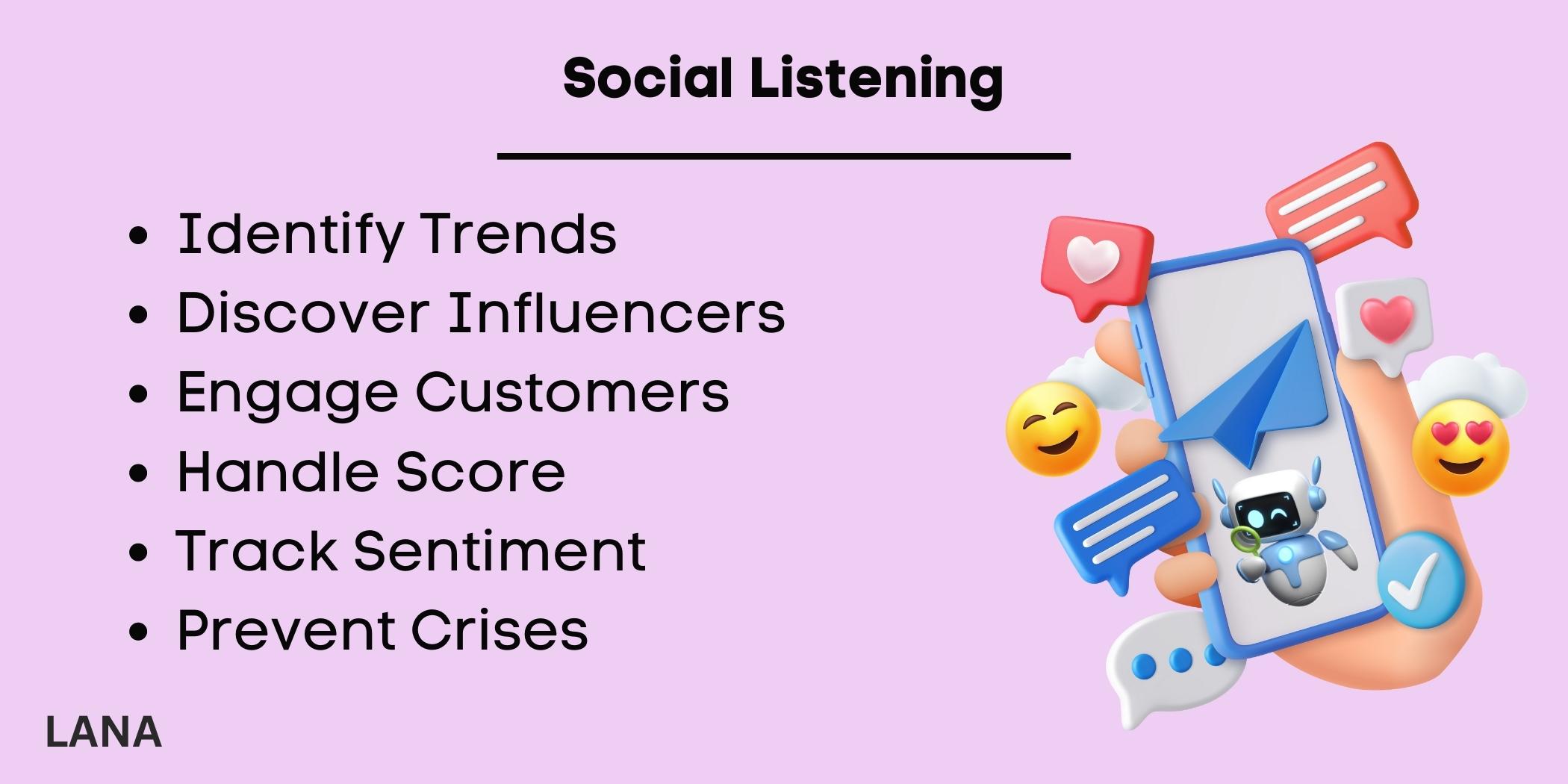
Manually monitoring brand mentions across social media platforms is laborious and often needs to be more accurate.
AI technologies like SentiOne automate and streamline your social listening activities, filtering out irrelevant noise and focusing on meaningful customer interactions.
With such AI tools, you can:
- Identify trending social media topics
- Discover influencers for PR and ad campaigns
- Engage potential customers
- Handle customer grievances
- Prevent social media crises
- Identify sales opportunities
- Track brand sentiment and reputation online
10. Super Useful Chatbots
Chatbots are AI-driven software programs that conduct audible or text conversations to provide automated responses.
These chatbots are effective marketing tools, especially when integrated into social media platforms.
They not only deliver customer service but also collect data for targeted messaging.
Types of AI Marketing
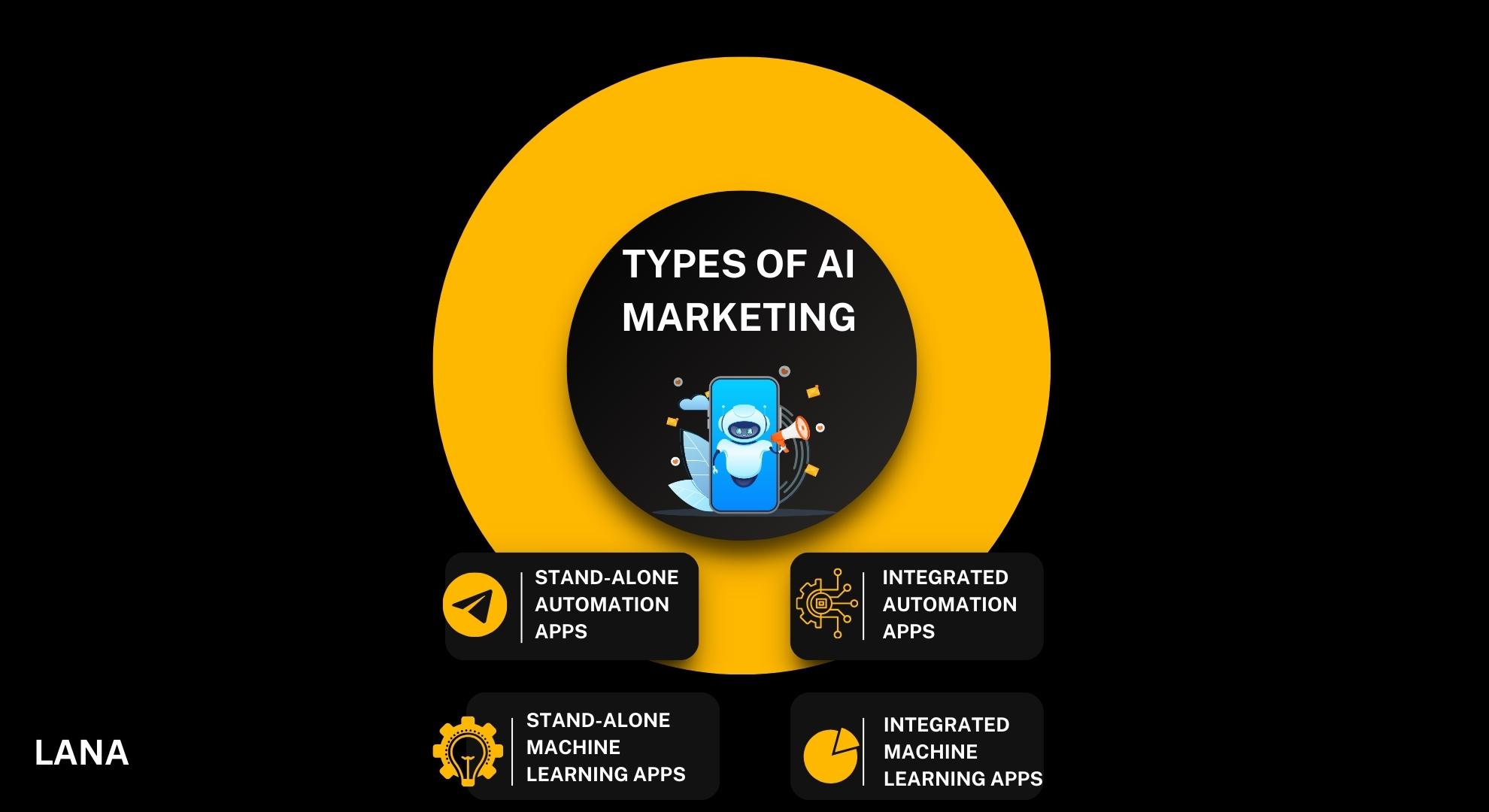
AI in marketing varies in complexity and capabilities, ranging from basic task automation to advanced machine learning applications.
Some AI tools operate independently, while others are designed to integrate seamlessly into existing programs.
Modern marketing software frequently combines automation and machine learning elements, making the distinctions between these categories unclear.
Stand-alone Automation Apps
Automation can be incredibly impactful even without the level of intelligence associated with machine learning.
Stand-alone automation applications operate outside more complex systems like CRMs and do not “learn” from user behavior.
They excel in carrying out automated tasks and executing intricate workflows.
Integrated Automation Apps
Unlike stand-alone variants, integrated automation apps function within broader systems, often within CRMs.
While they also operate based on logic rules and don’t learn from interactions, they assist with simpler functions, such as categorizing customers based on behavioral data.
Stand-alone Machine Learning Apps
When it comes to artificial intelligence, machine learning is the turning point. Stand-alone machine learning applications work independently and process vast data to make difficult decisions.
Over time, these advanced apps can refine their algorithms based on user interactions to enhance predictions and decision-making.
Integrated Machine Learning Apps
The full potential of AI can be realized when machine learning is integrated into larger systems like CRMs or advertising platforms.
Integrated machine learning apps inspect user behaviors and swiftly determine what offerings would be most appealing to them.
Unlike their stand-alone counterparts, integrated apps don’t require users to request information from a separate system; they seamlessly pull the necessary data and proactively offer insights.
The Benefits of Using AI in Marketing
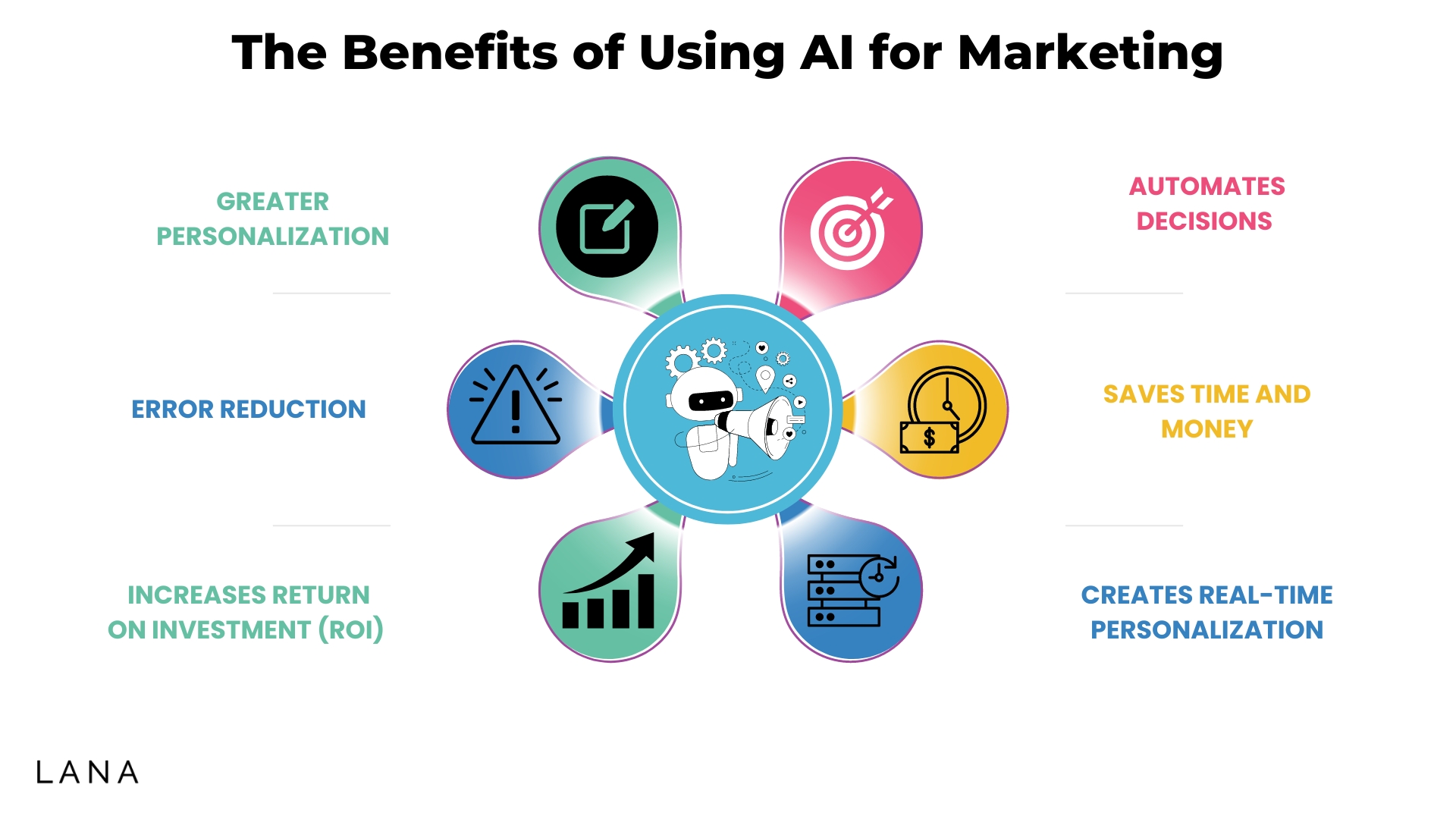
The benefits of using AI in marketing include automating complex tasks to save time and money and delivering personalized, real-time customer experiences that drive higher ROI (return on investment).
AI technologies also reduce errors, offer valuable insights, and enhance marketing effectiveness.
Automates Decisions
Among the most significant perks of utilizing AI in marketing is its ability to rapidly automate data-based decisions. In the marketing landscape, data is invaluable.
It can provide insights into how your audience will respond to your messages or guide you in optimizing your email marketing strategies.
Saves Time and Money
Investing in AI marketing tools may require initial capital, but the long-term cost savings are considerable.
AI tools enable companies to operate quickly and efficiently, reducing the need for a large staff to handle manual tasks.
You can then concentrate on hiring employees for essential functions. AI also minimizes the risk of human errors.
Creates Real-Time Personalization
Customers demand personalized interactions. AI marketing platforms adjust your sales and marketing strategies to offer adapted experiences for each customer.
Through predictive analytics, AI helps understand consumer behavior and preferences, similar to recommendation algorithms used by Google, Netflix, and Instagram.
It strengthens the customer’s relationship with your brand, and today’s consumers have come to expect this level of personalization.
Increases Return on Investment (ROI)
AI marketing tools help marketers optimally utilize data, reducing wasteful spending on ineffective campaigns.
AI technologies also offer deep insights into customer desires, funneling warm leads toward making a purchase. This contributes to an overall increase in your business’s return on investment (ROI).
Error Reduction
Incorporating AI technology limits the room for mistakes.
For example, AI can auto-fill customer data into your CRM, reducing manual errors like misspellings or wrong emails. Built-in security features ensure that customer data remains protected.
Greater Personalization
The importance of accurate personalization can’t be overstated, as evidenced by Netflix’s recommendation engine.
AI is the only technology capable of rapidly collecting and analyzing extensive data to deliver personalized content and recommendations to users interacting with your website or app.
Key Considerations for Successfully Using AI for Marketing
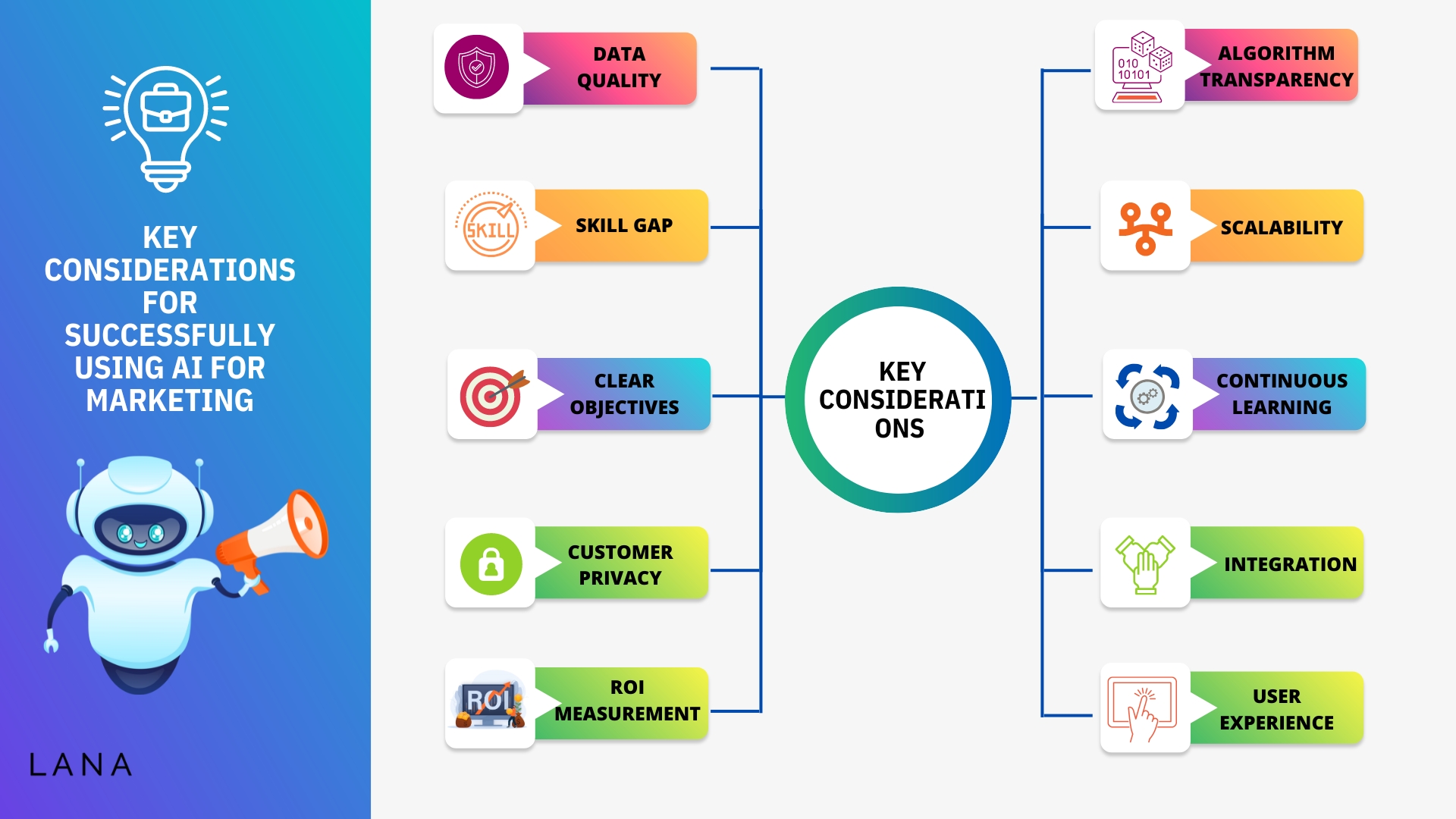
For AI marketing efforts to succeed, several key considerations should be kept in mind. Here are some of them:
- Data Quality: Ensuring the accuracy and relevance of the data you feed into your AI algorithms is crucial for reliable outcomes.
- Skill Gap: Evaluate your team’s technical skills to ensure they can effectively manage and utilize AI tools.
- Clear Objectives: Clearly outline the specific objectives and KPIs you aim to achieve through AI in your marketing strategies.
- Customer Privacy: To maintain consumer trust, data privacy, and ethical considerations should be integral to your AI implementation.
- ROI Measurement: Establish clear mechanisms for measuring the ROI of your AI initiatives to justify the investment and make data-driven decisions.
- Algorithm Transparency: Understanding how your AI algorithms function will enable you to ensure that they align with your marketing objectives.
- Scalability: Choose AI solutions that can scale with your business to maximize long-term utility.
- Continuous Learning: Regularly update your AI models with new data and adjust for emerging trends to maintain effectiveness.
- Integration: Make sure your AI tools integrate smoothly with existing platforms and databases to create a unified marketing ecosystem.
- User Experience: As you implement AI, it should not come at the cost of the customer experience but should enhance it.
Taking it to the Next Level: How to Use AI for Marketing
The incorporation of AI into your marketing strategy is just the beginning.
Consider tailoring and refining your AI algorithms to resonate with your target audience’s characteristics and preferences for truly amazing results.
To offer an even more individualized customer journey, utilize simple methods like emotion tracking, forecasting analytics, and rapid decision-making.
Keep your finger on the pulse of the evolving landscape of AI technologies and methodologies.
You’re maintaining a competitive edge by continuously updating your AI models and embracing state-of-the-art technologies and setting the stage for an innovative marketing approach.
Final Thoughts
Learning how to use AI for marketing has been a game-changer for me. Remember the hours spent crafting the perfect blog post or figuring out email campaigns? That’s history.
I’ve personally used AI tools for my blog and even tried email generators to boost my sales. The result? More engagement and a happier me.
They write in a way that sounds like me, they give me marketing insights like my manager, and these tools offer more than help. And let’s face it, in today’s fast-paced world, any help is good help.
So, if you’re finding it tough to keep up with your marketing tasks, give AI a shot.
It’s like having an expert friend who always knows what to say. Trust me, it’s worked wonders for me, and I bet it will for you, too.
FAQs.
What is an AI marketing tool?
AI marketing tools utilize artificial intelligence to automate decision-making, allowing human marketers to conserve time and resources.
Using LLM for generating email, social media, and ad copy to employ predictive analytics that autonomously identify top-performing ads eliminates the need for marketers to parse through shifting data manually.
What is the best use of AI for marketing?
Content personalization is one of AI’s most effective applications in marketing. AI allows marketers to tailor customer experiences by analyzing online behaviors and user-specific data.
AI can dynamically generate content like customized web pages, lead emails, and social media posts based on metrics such as name, profession, and online actions.
What are some real-world examples of AI for marketing?
Real-world examples of AI for marketing comprise personalized e-commerce product suggestions, customer service chatbots, predictive analytics to single out high-value consumers, and sentiment analysis for keeping tabs on social media brand reputation.
What are the challenges in omplementing AI for marketing?
Implementing AI in marketing comes with challenges, including data quality, technical skill gaps within teams, and ethical considerations around customer privacy.
Businesses must address these factors for successful AI adoption, ensuring the technology aligns with their marketing objectives while being scalable as the company grows.

About The Author
Lana is a full time content creator, blogger, and SEO strategist. She coaches up-and-coming bloggers over at Blog Growth Engine and helps select SaaS startups with their SEO and content strategy. Before starting this blog, Lana was the VP of Engineering at an AI startup and a Data Scientist for over 6 years. She also holds a Bachelor of Science Degree in Statistical Data Science from the University of California, Davis. Follow LanaGerton.com to learn how she blends data-driven approaches and AI technology into her content creation and SEO frameworks.






